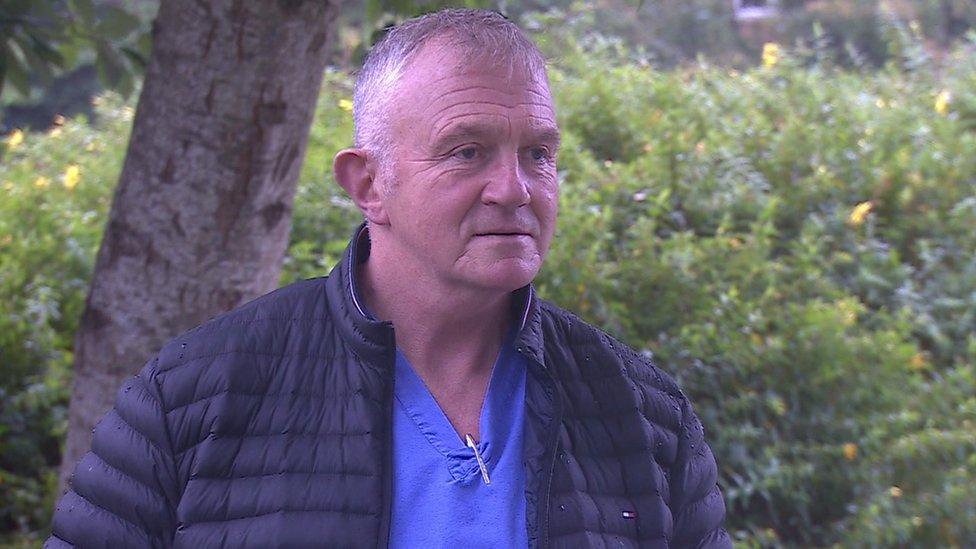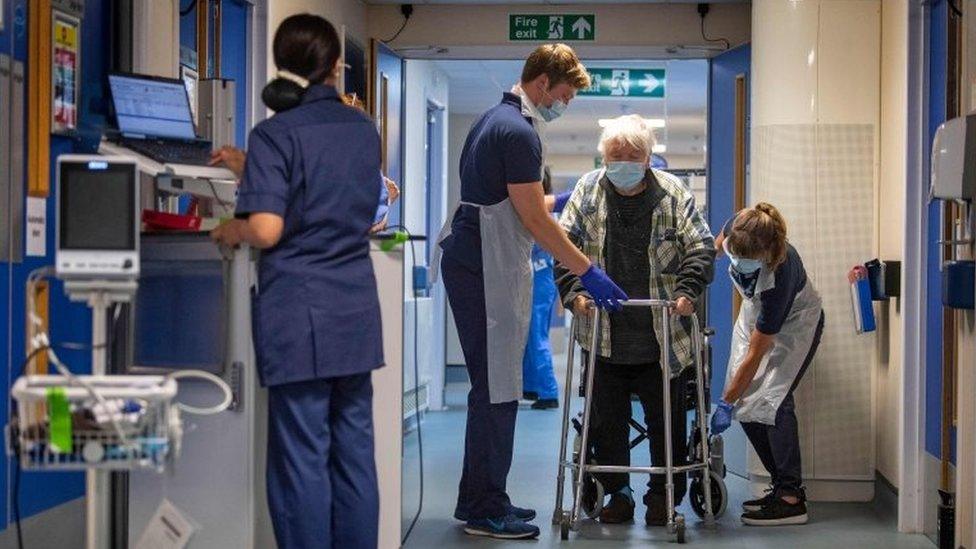Covid in Wales: Routine surgery lists have increased six-fold
- Published
- comments

Orthopaedic surgeon Chris Wilson has called the waiting times "depressing"
The list of people waiting for routine surgery in Wales is nearly six times longer than a year ago with 57,445 awaiting an operation, figures show.
One orthopaedic surgeon has warned waiting times for things like knee and hip replacements could be three years.
Planned surgery in Wales was halted in March as Covid struck but most health boards have resumed some procedures.
Now doctors want parts of hospitals to be quarantined so they can restart some routine surgery.
The Welsh Government says health boards are working to open more services and "keep Covid and non-Covid patients apart".
New figures show that 57,445 people in Wales were waiting for elective operations in August 2020, compared with 9,859 during the same period in 2019.
The data, obtained by the BBC in a Freedom of Information request, also shows the number of patients waiting more than 36 weeks for elective treatment has grown from 13,501 at the start of the pandemic.
Health boards say the Covid-19 crisis has caused "significant disruption" and the most urgent patients are being prioritised.
'It will take a whole generation to recover'
Orthopaedic surgeon Chris Wilson called the waiting time figures "depressing" and was not surprised they have "shot up through the roof".
"These patients are in a lot of pain," said Mr Wilson, who is head of the orthopaedic surgery department at the Cardiff and Vale University Health Board.
"It's frustrating we can't offer them treatments like hip replacements which we know in the vast majority of cases is going to be life changing.
"All the surgeons feel impotent that we've got this large population of patients waiting for this type of surgery and they're not yet in a position to do anything about it and we know that the problem is growing week by week."

Colin Jones has been waiting nine months for a hip replacement
He said if something isn't done to reduce the waiting lists "the problem will grow and we'll have such a huge number of patients waiting for this type of surgery that it will take a whole generation to recover".
Colin Jones, from Llanelli, says he has been living in "terrible pain" since his GP referred him for a possible hip replacement nine months ago.
He says he has been "left in limbo" waiting for an appointment with a consultant.
"All they can offer me at this stage is pain relief and there's no end in sight. It's very frustrating," said the 71-year-old.
The Royal College of Surgeons has called on Welsh Government to ramp up the development of so-called "green zones" or "Covid-light" areas in hospitals.
These are wards with stringent rules where people movement is low so the risk of coronavirus transmission is low, in order to allow the resumption of more planned surgeries.

Surgeons say they want to get their patients the best treatment
Richard Johnson, director of the college in Wales, said a recent survey found 30% of surgeons in the Welsh NHS were unable to access such facilities.
"We supported the stopping of elective surgery to allow the NHS to prepare for the pandemic," he said.
"But this is now seven months into the pandemic and we seem to be moving no further forward very quickly to work on the backlog of patients that are waiting for their surgery.
"At the centre of all this are patients who are suffering and as surgeons we want to offer the best treatment for our patients to stop that suffering so they can get back to a normal activity.
"At the present time the government aren't producing waiting times figures. Once we know what the scale of the problem is, then we can make some plans going forward of managing the situations."

GLOBAL SPREAD: How many worldwide cases are there?
TREATMENT: How close are we to helping people?
VACCINE: How close are we to finding one?
TRAVEL RIGHTS: Can I get a holiday refund?

The Welsh Conservatives have called on the Welsh Government to "ensure all avenues are explored", including field hospitals and "Covid-light" hospitals.
"And to commission - where it exists - extra capacity from the independent sector to help reduce the backlog, and get patients diagnosed and treated," health spokesman Andrew RT Davies said.
The Welsh Government said health boards were "working to restart more services" and "doing all they can" to keep Covid and non-Covid patients separate.
"They have been changing the care environment with the creation of 'green zones'," it said.
"The work is being clinically led and consultants are currently prioritising patients in order of clinical need."
- Published10 September 2020

- Published13 August 2020

- Published30 April 2020

- Published14 March 2020
